1. Joint Research Projects
2022
Project 9- “Assuring the Quality of Online Lectures in the spread of COVID-19 pandemic”
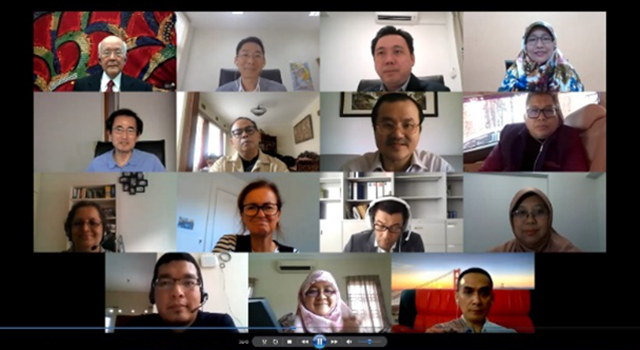
Study Period: October, 29, 2020 to August 19, 2021.
This workshop was held on the theme of how schools can rebuild a system to ensure the “assurance of educational quality” in the changing environment caused by COVID-19. This Workshop was held monthly on the third Thursday of the month. Up to August 2021, cases for 2 schools were studied at each workshop.
The 1st Online Workshop
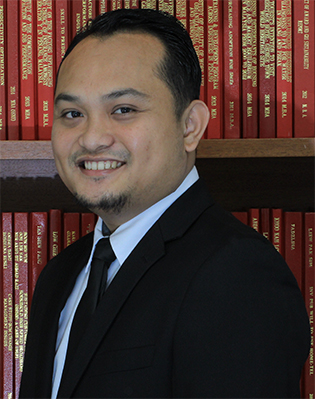
Speaker: Associate Professor Dr. Yudi Fernando, Department of Business Engineering,Faculty of Industrial Management, Universiti Malaysia Pahang, Malaysia
Report: “Electronic Teaching and Learning: UMP Experiences During Recovery Phase of the COVID-19 pandemic
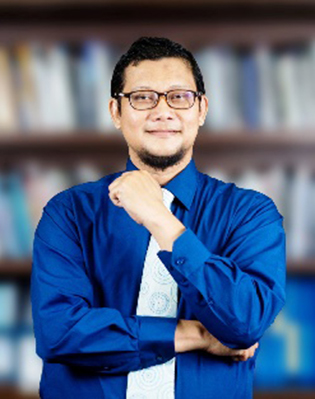
Speaker: Associate Professor Dr. Gancar C. Premananto, Head of Management Department, Faculty of Economics & Business, Universitas Airlangga, Indonesia
Report: “Teaching & Learning Process During the Pandemic: The Rise of IT & Creativity”
The 2nd Online Workshop
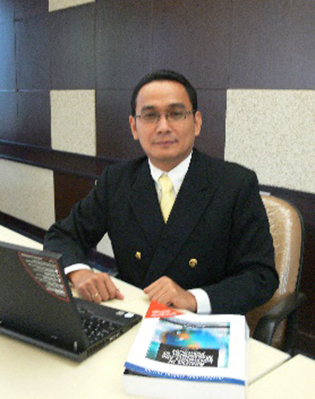
Speaker: Senior Lecturer Dr. Werner R. Murhadi, Faculty of Business and Economics, Universitas Surabaya, Indonesia
Report: “UBAYA e-Learning”
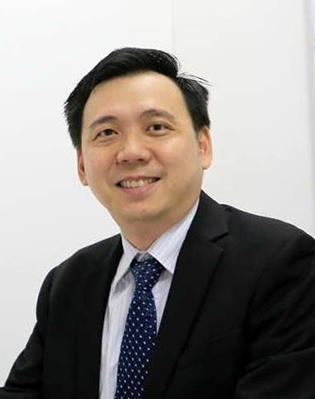
Speaker: Assistant Professor Dr. Hen Kai Wah, Faculty of Accountancy and Management, Universiti Tunk Abdul Rahman, Malaysia
Report: “Online Experience During Covid-19: Challenges and Opportunities for Universiti Tunk Abdul Rahman”
The 3rd Online Workshop
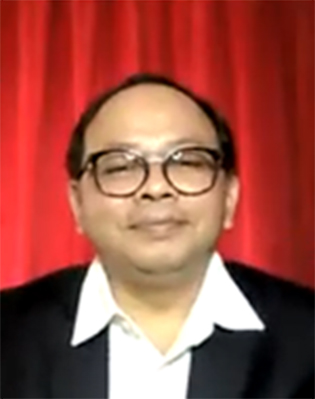
Speaker: Assistant Professor Dodie Tricahyono, Ph.D., School of Economics and Business, Universitas Telkom, Indonesia
Report: “Covid-19, Online Learning and Quality Assurance at MM Telkom University”
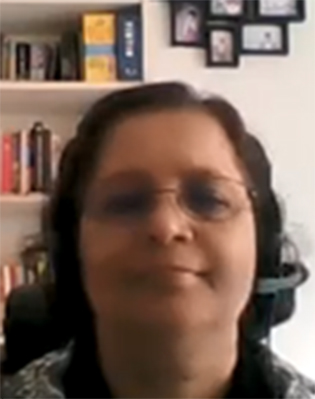
Speaker: Associate Professor Dr. Veena Jadhav, SP Jain School of Global Management, Singapore
Presentation: “Assuring the Quality of Online Lectures”
The 4th Online Workshop
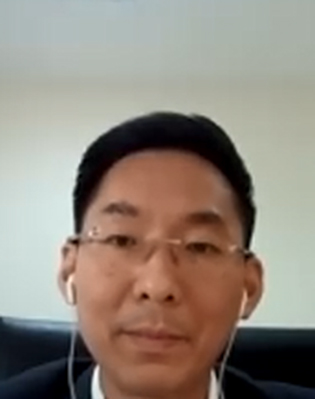
Speaker: Associate Professor Dr. Danaipong Chetchotsak, Faculty of Engineering, Khon Kaen University, Thailand
Report: “Ensuring quality of the online teaching at KKU”
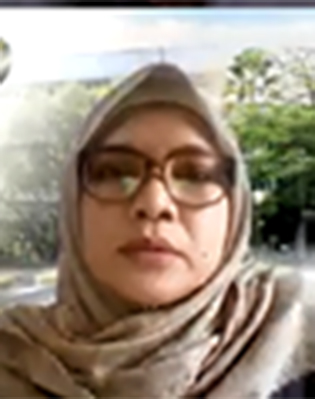
Speaker: Vice Director Yeshika Alversia, Faculty of Economics and Business, Universitas Indonesia, Indonesia
Report: “Online Lectures and Issues to be improved for Assuring the Quality of the School’s Learning System”
The 5th Online Workshop
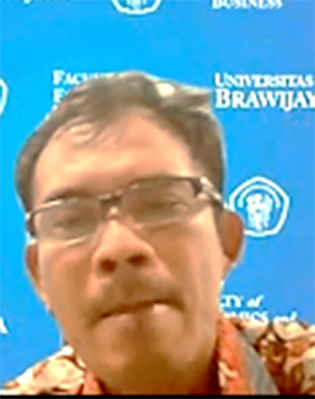
Speaker: Vice Dean Dr. Ainur Rofiq, Faculty of Economics and Business, Universitas Brawijaya, Indonesia
Presentation: “Online Education Practices during Pandemic COVID-19: Experiences from UB”
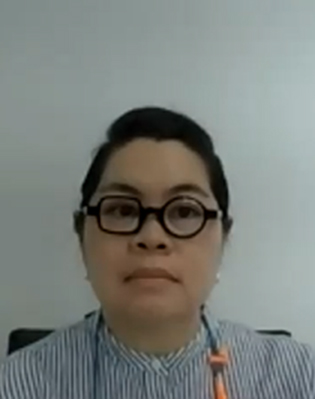
Speaker: Senior Lecturer Nalinee Mohprasit, Ph.D., Faculty of Business, Economics and Communications, Naresuan University,Thailand
Report: “NU online learning and challenges for effective learning environment”
The 6th Online Workshop

Speaker: Adjunct Associate Professor Catherine Sibala, School of International Corporate Strategy, Hitotsubashi University, Japan
Report: “Assuring the quality of online courses at Hitotsubashi ICS”

Speaker: Senior Lecturer Dr. Jayne Bye, School of Business, Western Sydney University, Australia
Report: “Quality Teaching and Learning During COVID-19-a perspective from the School of Business, Western Sydney”
The 7th Online Workshop
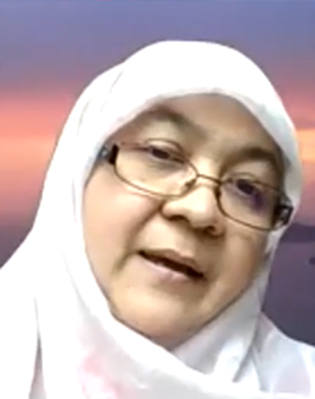
Speaker: Assistant Professor Zabeda binti Abdul Hamid, Ph.D., International Islamic University Malaysia, Malaysia
Report: “The7th ABEST21 Online Workshop”
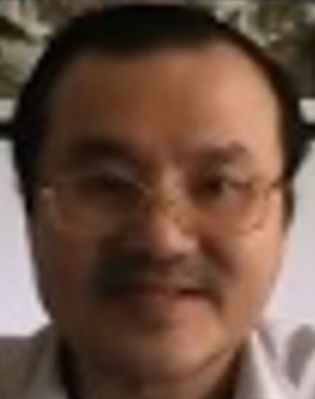
Speaker: Professor Dr. Huam Hon Tat, Putra Business School, Malaysia
Report: “Putra Business School”
The 8th Online Workshop

Speaker: Manager Dr. Rosly Othman, Graduate School of Business, Universiti Sains Malaysia, Malaysia
Report: “CONDUCTING ONLINE MBA DURING THE COVID 19 PANDEMIC IN MALAYSIA BY GRADUATE SCHOOL OF BUSINESS, UNIVERSITI SAINS MALAYSIA”
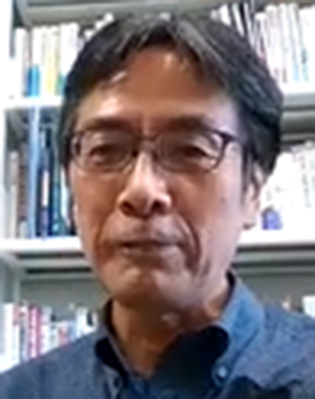
Speaker: Professor Dr. Chiaki IWAI, Graduate School of Global Management, Aoyama Gakuin University, Japan
Report: “The 8th ABEST21 online workshop 2021 June”
The 9th Online Workshop
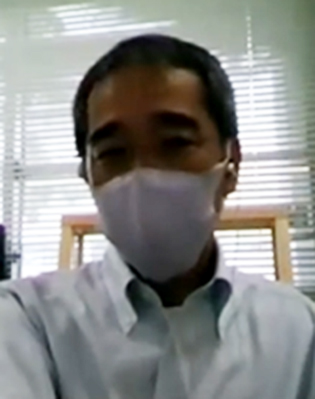
Speaker: Professor Dr. Nobuyuki ISAGAWA, Graduate School of Management, Kyoto University, Japan
Report: “Online education and its quality”

Speaker: Lecturer Suthasinee Susiva, Ph.D., Graduate School of Commerce, Burapha University, Thailand
Report: “Challenges of online teaching faced by the postgraduate students”
The 10th Online Workshop
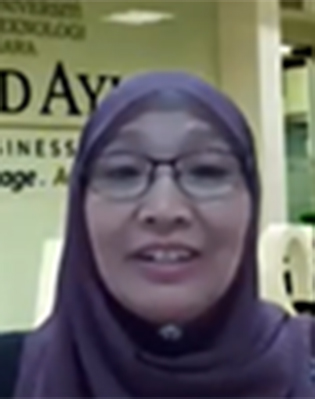
Speaker: Deputy Dean Associate Prof. Dr. Siti Zaleha Sahak, Arshad Ayub Graduate Business School, Universiti Teknologi MARA, Malaysia
Report: “Assuring the Quality of Online Education”
Presentations by each speaker are available on the “Libarary” page.
2019
Project 8-“Humanizing Management Education
for Sustainable Economic Development in Asia-Pacific”
By Coordinator: Prof. Dr. Ming Yu Cheng, Universiti Tunku Abdul Rahman, Malaysia
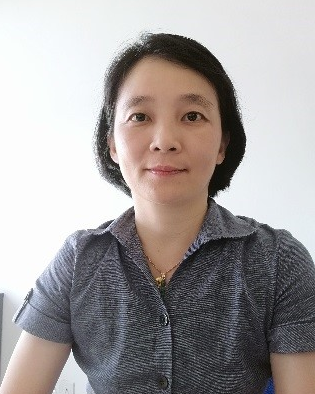
“Humanizing the School’s Research and Education” is one of the important criteria of ABEST21’s accreditation system for quality improvement. For this purpose, ABEST21 has organized a research team to examine the efforts taken by business schools to incorporate the humanizing aspect into their management education; to identify challenges in the implementation of humanizing efforts; and to investigate key stakeholders’ viewpoints on the importance of humanizing management education.
The project will be conducted in three phases. The research team is currently undertaking Phase 1 activity to analyze the humanizing practices among ABSET21 members. For this purpose, questionnaires were distributed to 55 ABEST21 members selected to participate in the survey. The survey covers schools located in Japan, Indonesia, Thailand Singapore, USA, Russia, China and Malaysia.
The data collection for Phase 1 study started in August 2019 by contacting the Deans or representatives of the selected schools with the request to complete the questionnaire. Depending on the feedback collected, interviews may be arranged to gather additional information. To date, the research team is still in the process of collecting the data as some schools are yet to send their feedback as requested. Cooperation and support from ABEST21 members is highly appreciated in order to complete this exercise successfully.
At the same time, the Coordinator is reviewing the schools’ humanizing initiatives and practices based on the information extracted from the Self-Check Reports submitted by the members for accreditation purposes. The analysis aims to identify trends and best humanizing practices among ABEST21 members.
The preliminary findings of the research project will be shared at the ABEST21 International Symposium 2020 on March 11, 2021 entitled “Humanizing Higher Education for Sustainable Economic Development in Asia-Pacific”.
2014
Case Writing Project- “Fuji Xerox CSR”
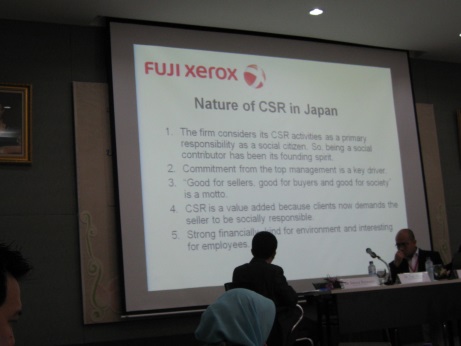
The main purpose of the Joint Research Project 6 is to develop teaching materials to be used by ABEST21 member schools. To realize this goal, we decided to work on structuring of “Proactive Knowledge Sharing Platform” for business school education and deepening of “Academic-Industry Collaboration”. Joint Research Project-6 Case Writing started with CSR, supported by Fuji Xerox Co., Ltd. The Case Writing project focuses on CSR issues that Fuji Xerox and its subsidiaries face in Japan, Thailand, Malaysia and Indonesia, where cultural, social and economic backgrounds vary. The 1st Country Chair meeting for Research Project-6 was held at Management & Science University on December 13, 2012. The meeting was chaired by Coordinator Dean Siriwut Buranapin, who provided explanation about the research method and schedule for “Business Management Case Writing”. The meeting was attended by the following members.
- Senior Manager-Marketing, Mr. Tetsuri Yamaguchi (Fuji Xerox Asia Pacific Pte Ltd)
- Senior Quality Executive, Mr. Marcellinus Bin Frederick Lamhai (Fuji Xerox Asia Pacific Pte Ltd)
- CEO & President Fumio Itoh (ABEST21)
- Executive Secretary Professor Ming Yu Cheng (Universiti Tunku Abdul Rahman)
- Senior Lecturer Hen Kai Wah (Universiti Tunku Abdul Rahman)
- Coordinator, Dean Siriwut Buranapin (Chiang Mai University)
- Malaysia Team Chair Professor Azlan Amra (Universiti Sains Malaysia)
- Indonesia Team Chair Director Arief Daryanto (Bogor Agricultural University)
- Japan Team Chair Associate Professor Yuji Maeda (Kwansei Gakuin University)
2013
Project 7-“Advanced University Reform Promotion Project” by MEXT
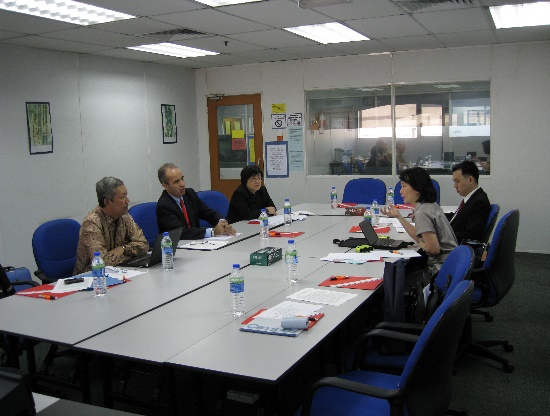
ABEST21 submitted a bid for the public tender for “Research Project for Overseas Development of Sectoral University Assessment”, a research theme under the “Advanced University Reform Promotion Project” by MEXT. The tender was opened on July 24 and the technical proposal submitted by ABEST21 was successfully accepted. In the proposal ABEST21 suggests to promote international development in accreditation for business schools which aim to nurture management professionals in Asia. Specific steps are ①Conduct research study and demonstration analysis of educational quality guarantee/assessment system at business schools in ASEAN countries, especially Indonesia and Malaysia, ②Compare the guarantee/assessment system of Japan, Thailand, Indonesia and Malaysia based on the results of demonstration analysis, and ③Develop a model of quality guarantee/assessment system for business school accreditation which corresponds to the cultural diversity among ASEAN countries.
2012
Project 6-“Developing ASEAN Quality Assurance System Model”
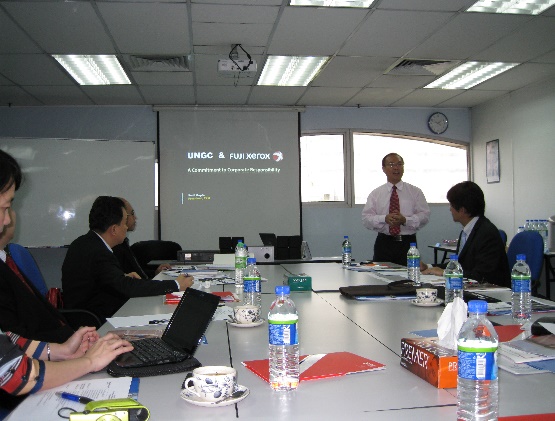
Research Project 7 is implemented as a part of the “Research Project for Overseas Development of Sectoral University Assessment” under the “Advanced University Reform Promotion Project” in 2012 by MEXT. The project conducts a survey on quality assurance system of higher education in ASEAN countries in particular, aiming to develop our accreditation activities in Asia. ABEST21 teams in Japan, Thailand, Malaysia and Indonesia respectively conducts a research on education quality assurance system. Educational quality assurance is a prerequisite for business schools to promote industry-academia collaboration and cooperation among universities, for globalization of management education and establishment of consortium. To meet the needs of the economic globalization age, we believe it is necessary to conduct a research on advanced education quality assurance/accreditation system in Asia and develop a model for the assessment system.
The 1st Country Chair meeting for Research Project-7 was held at Management & Science University on December 12, 2012. At the 1st meeting, President of ABEST21 explained the contents of Research Project-7 in detail, followed by exchange of various opinions. The 1st meeting was attended by the following members.
- Fumio Itoh (President, ABEST21)
- Professor Ming Yu Cheng (Executive Secretary /Universiti Tunku Abdul Rahman)
- Senior Lecturer Hen Kai Wah (Universiti Tunku Abdul Rahman)
- Malaysia Team Chair Dean Ali Khatibi (Management & Science University)
- Indonesia Team Chair Dean Nury Effendi (Universitas Padjadjaran)
- Thailand Team Chair Sujinda Chemsripong (Naresuen University)
2011
Project 5- “Developing Asian MBA Curriculum”
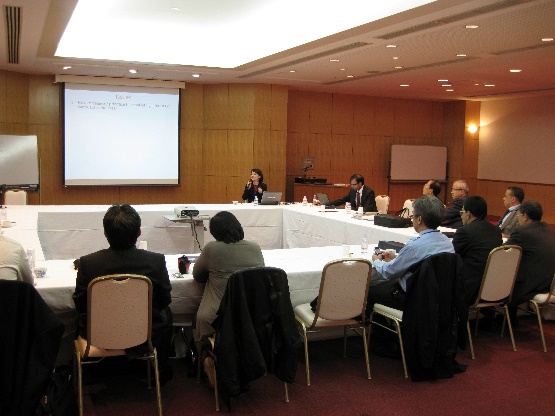
Based on the result of Joint Research Project 4, a survey was conducted on the ways of developing MBA curriculum which fosters the competencies of management professionals at business schools.
Joint Research Project-5 was conducted with participation of 14 universities from 10 Asian countries. The results of the research were published on February 28 under the title of “Enhancing the Quality of Business Management Education in a Globalized World” (ISBN 978-4-905204-01-5, not for sale).The results of, with members of the Research Project-5 are as below. (2011 academic year)
Chair: Professor Ming Yu Cheng (University of Tunku Abdul Rahman University, Malaysia)
Members:
- Associate Professor Siriwut Buranapin (Chiang Mai University, Thailand)
- Professor Hong Joo Jung (Sungkyunkwan University, Korea)
- Associate Professor Amir Mahmood (Newcastle University, Australia)
- Professor Ruslan Prijadi (University of Indonesia, Indonesia)
- Professor Qinhai Ma (Northeastern University, China)
2010
Project 4- “Competencies of Management Professionals”
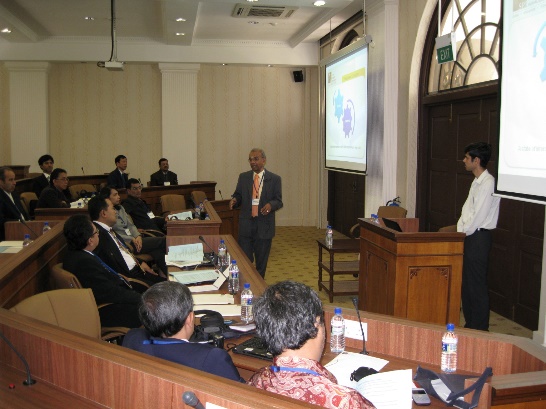
The survey on management competencies was done with the participation of 13 business schools from 8 Asian countries. On July 2 and 3, 2010, final presentations on management competencies survey were given at the Conference held at S.P. Jain School of Global Management in Singapore.
Survey was conducted on competencies of management professionals nurtured at business schools in Asia. The result was published under the title ”Competencies of Management Professionals” (ISBN 978-4-905204-00-8). (2010 academic year)
2009
Project 3-“Corporate Needs for MBA Education”
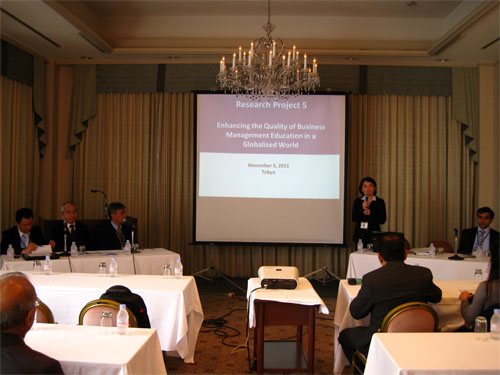
ABEST 21 conducted a research on “corporate expectation on business school education” as a joint international project supported by Ministry of Education, Culture, Sports, Science and Technology (MEXT). This was done as a part of strategy for “collection of data for diversity, collaboration and development of international model of evaluation systems.” This was conducted to acquire necessary data to improve the quality of business school education thorough questionnaire to 7 schools on “what is expected of business school education from company’s prospective” in each countries. The seven schools are Tsukuba University, Japan, Seoul National University, Korea, Moscow State University, Russia, Fudan University, China, Management & Science University, Malaysia, Tecnlogico de Monterrey, Mexico. The result of this research was published from Moscow University under the title of “Improving Quality of Management Education” (not on sale).
2008
Project 2-“Developing International Peer Review System Model in Asia”
Peer review cases of business schools in Asia were accumulated. Based on comparison of these cases peer review model suitable for various types of education system was developed. (2008 academic year)
2007
Projects 1-“Establishment of International Peer Review System in Asia”
In order to establish a peer review system to guarantee the quality of management education offered by business schools in Asia, on-site surveys were conducted in Asian countries on management education system and quality guarantee system. (2007 academic year)
2. Research Publications
March 2015
“Fuji Xerox CSR” Case
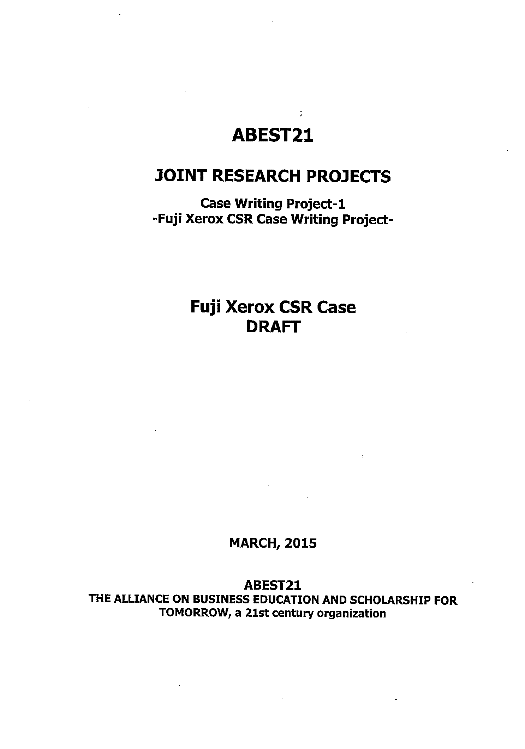
The Case Writing Project started as part of the ABEST21 Joint Research Projects to create teaching materials among the members. The first case on Fuji Xerox was completed with kind cooperation of Fuji Xerox Co., Ltd. Upon receiving positive reaction from the students, we decided to publish this case. The case looks into the cross-cultural CSR activities in the Japanese Head Office, subsidiaries in Thailand and Malaysia, and a sales company in Indonesia. The contents of the case are:
- Fuji Xerox Co., Ltd. – Japan
- Fuji Xerox Eco-Manufacturing Co., Ltd. -Thailand
- Fuji Xerox Asia Pacific Pte Ltd. – Malaysia
- PT. Astra Graphia, Tbk. – Indonesia
All chapters consist of a Case and a Teaching note. The next case to be created by ABEST21 will focus on Toshiba Corporation’s Corporate Governance.
March 2013
“Research Project for Overseas Development of Sectoral University Assessment”
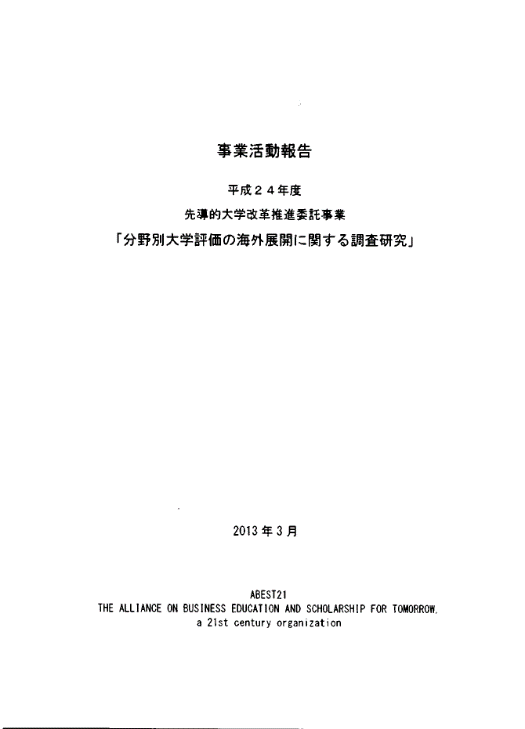
ABEST21 submitted a bid for the public tender for “Research Project for Overseas Development of Sectoral University Assessment”, a research theme under the “Advanced University Reform Promotion Project” by MEXT. The tender was opened on July 24 and the technical proposal submitted by ABEST21 was successfully accepted. In the proposal ABEST21 suggests to promote international development in accreditation for business schools which aim to nurture management professionals in Asia. Specific steps are ①Conduct research study and demonstration analysis of educational quality guarantee/assessment system at business schools in ASEAN countries, especially Indonesia and Malaysia, ②Compare the guarantee/assessment system of Japan, Thailand, Indonesia and Malaysia based on the results of demonstration analysis, and ③Develop a model of quality guarantee/assessment system for business school accreditation which corresponds to the cultural diversity among ASEAN countries.
February 2012
“Enhancing the Quality of Business Management Education in a Globalized World”
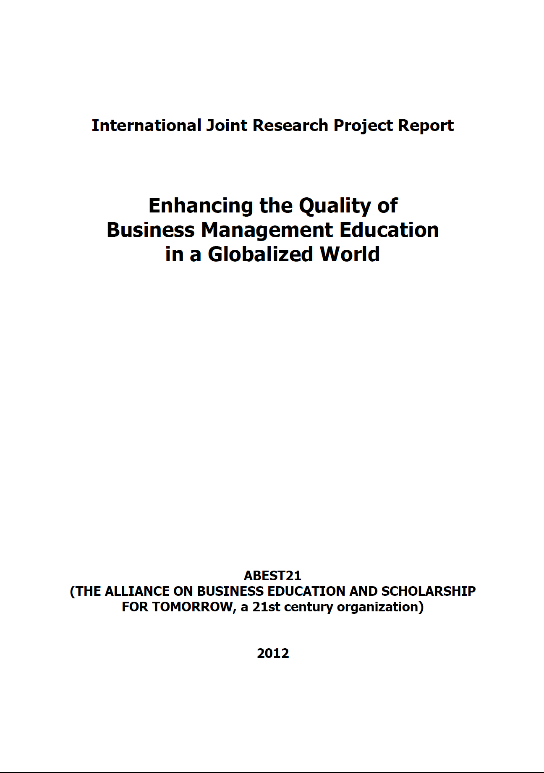
Since last year ABEST21 international Joint Research Project-5 on Asian MBA Curriculum Development was conducted with participation of 14 universities from 10 Asian countries. The results of the research were published on February 28 under the title of “Enhancing the Quality of Business Management Education in a Globalized World” (ISBN 978-4-905204-01-5, not for sale). The reseach focuses on “corproate needs for business education”, “competencies required for management professionals” based on the needs, and extends to “curriculum development for Asian MBA”. We believe that this research will contribute to promotion of exchange among Asian universities. For details please contact ABEST21 Office.
October 2010
”Competencies of Management Professionals”
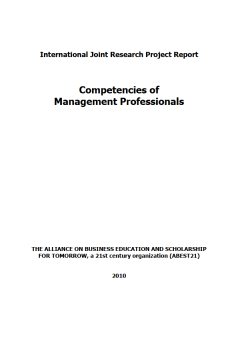
The results of the survey on “Competencies of Management Professionals” was published by ABEST21 in October 2010. The survey on management competencies was done with the participation of 13 business schools representing 8 Asian countries. The respondents – MBA students, MBA holders and company personnel managers – were asked what competencies are required for management professionals, and the gap analysis on their expectations and the actual state of competency levels was conducted. All statistical analyses were entrusted to The Institute of Statistical Mathematics, Research Organization of Information and System, an Inter-University Research Institute Corporation of Japan. The publication covers overall analysis of the survey results as well as country-specific analyses. (ISBN978-4-905204-00-8)
November 2008
“Improving Quality of Management Education”
ABEST 21 has been asked by Japanese Department of Education and Science (MEXT) to run a research on ‘corporate expectation on business school education’ as a joint international project. This was done as a part of strategy for ‘collection of data for diversity, collaboration and development of international model of evaluation systems’ (130 million yen budget project) This was conducted to acquire necessary data to improve the quality of business school education thorough questionnaire to seven schools on ‘what is expected of business school education from company’s prospective’ in each countries. The seven schools are Tsukuba University, Japan, Seoul National University, Korea, Moscow State University, Russia, Fudan University, China, Management & Science University, Malaysia, Tecnlogico de Monterrey, Mexico. The result of this research was published from Moscow University under the title of “Improving Quality of Management Education” (ISBN 978-5-903148-31-3). We also hosted a study group on topic of international comparison of corporate demands on management education. (2009 academic year)
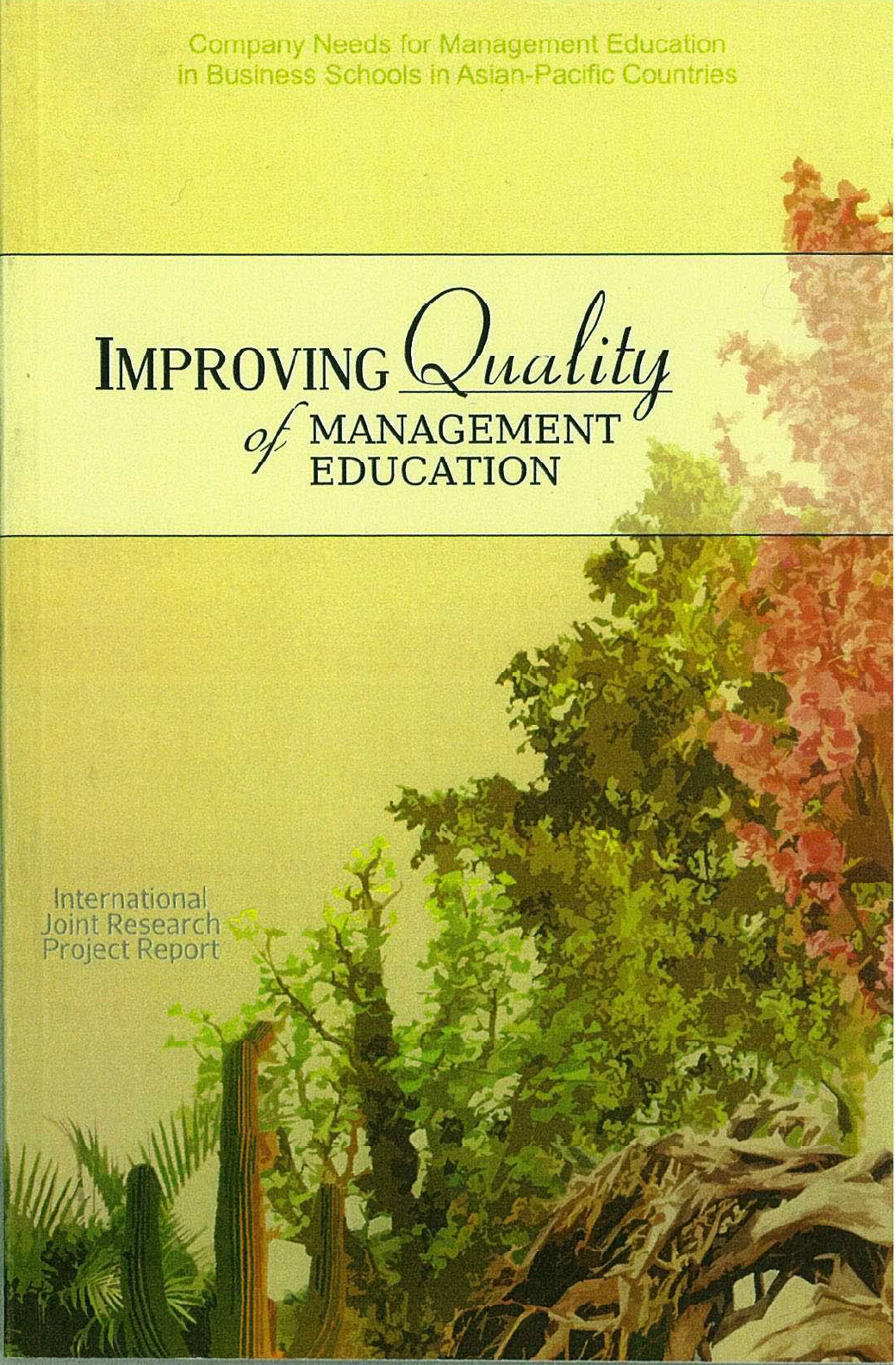
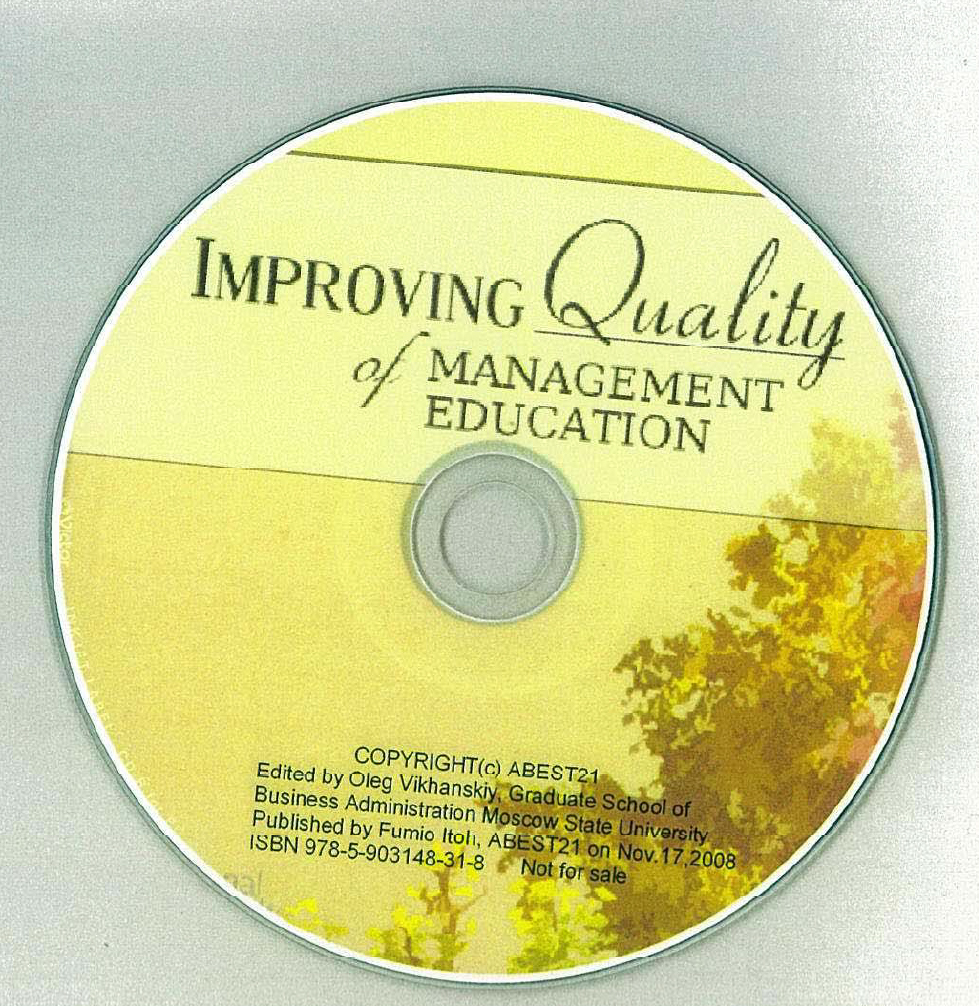
3. Special Lectures
March 6, 2018
“Introduction to the Current Situation of Japanese Higher Education”
Director Kazumi Shindo
Office for International Planning, Higher Education Bureau, MEXT, Japan
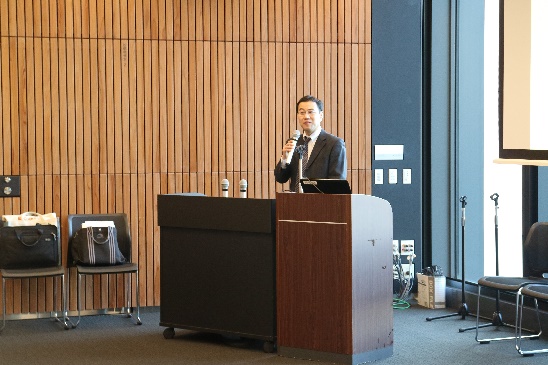
As part of the Global Knowledge Network activities promoting academic international exchange among the accredited schools, special speech was given by Mr. Kazumi Shindo, Director, Office for International Planning, Higher Education Bureau, MEXT, on “Introduction to the Current Situation of Japanese Higher Education” featuring higher education globalization project at MEXT.
Another speech was given by Dean Professor Dr. Sudarso Kaderi Wiryono, School of Business and Management, Institut Teknologi Bandung, Indonesia, on globalization of higher education in Indonesia. It was mentioned that university reform is promoted through international accreditation, implying the development of educational and research environment that responds to globalization, and therefore the expectations toward ABEST21 are very high.
March 8, 2017
“Nurturing Management Professionals in Malaysia”
Rector Prof. Dr. Dato’ Daing Mohd Nasir Bin Daing Ibrahim Universiti Malaysia Phang, Malaysia
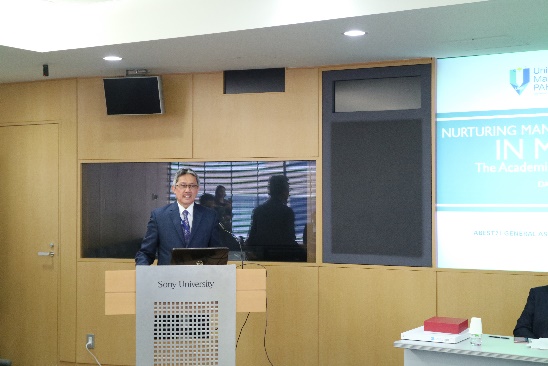
On March 8, 2017, after the granting of accreditation certificates, Prof. Dr. Dato’ Daing Mohd Nasir Bin Daing Ibrahim (photo), the Rector of Universiti Malaysia Pahang (Malaysia), gave a special speech on “Nurturing Management Professionals in Malaysia”. The speech referred to the reality of fostering management professionals in Malaysia, and it was emphasized that accreditation is useful to maintain the education and research environment for nurturing management professionals. Since Universiti Malaysia Pahang received accreditation in the MOT field, it expects interchanges with schools from the same field.
November 10, 2016
“Toyota’s Kaizen”
Professor Hideyuki Kobayashi,
SBI Graduate School of Management, Japan
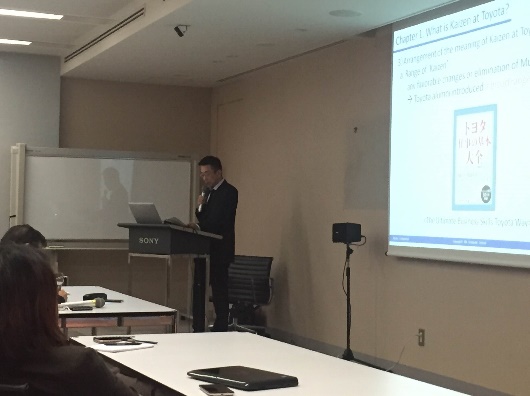
On November 10, 2016, ABEST21 Global Knowledge Network Lecture was held after General Assembly Professor Hideyuki Kobayashi who joined SBI Graduate School in July 2016 from Toyota Motor Corporation.
SBI Graduate School of Management has invited Professor Hideyuki Kobayashi from Toyota Motor Corporation to join the faculty effective July 2016. At Toyota, Professor Kobayashi was engaged in design, product planning and target costing. He has rich experience in international business. His academic career includes MBA from Nagoya University of Commerce and Business, expert study in management control system. He is expecting to receive a doctor’s degree from Nagoya University by the end of this fiscal year. He has given lectures outside Toyota Motor, such as at Nagoya Institute of Technology.
There are 3 main reasons why SBI invited Professor Kobayashi to join the faculty. First of all is to hold a class reflecting Professor Kobayashi’s business experience and theory cultivated through research activities at Toyota; a class to focus on “R&D”, “Operations Management” and “Toyota Kaizen”. Previously SBI did not have full-time faculty member who is an expert in manufacturing or R&D. However some of SBI’s students are involved in R&D for pharmaceutical companies or operations in manufacturing. Professor Kobayashi will cover these areas through lectures and guidance for students.
March 5, 2015
Fuji Xerox Co., Ltd. : “Global Strategies”
Mr. Masashi Honda,
Senior Vice President and Executive General Manager of Asia Pacific
Operations, Fuji Xerox Co., Ltd.
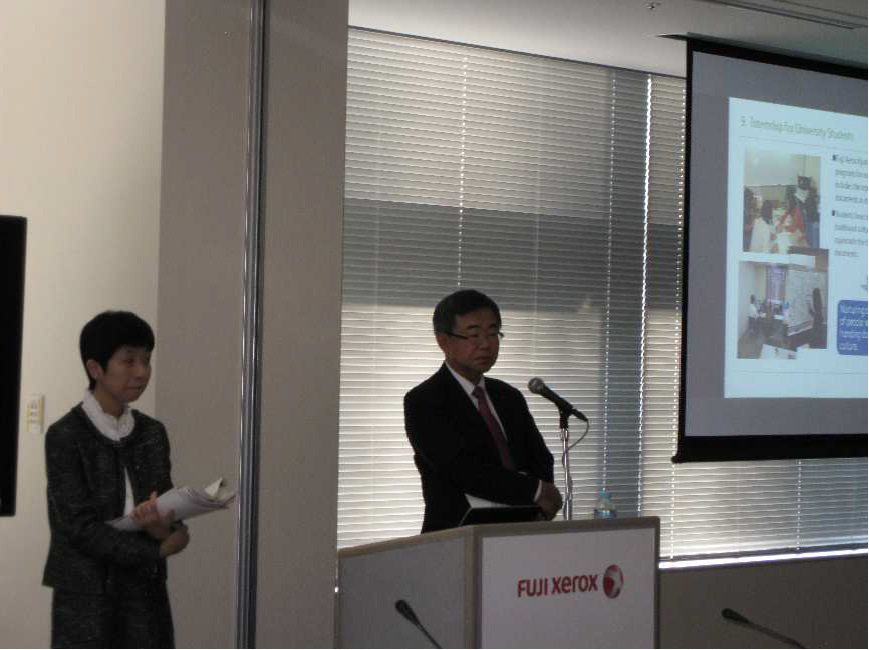
At Fuji Xerox Head Office in Roppongi, Tokyo, a lecture was given by Mr. Masashi Honda, Senior Vice President and Executive General Manager of Asia Pacific Operations, Fuji Xerox Co., Ltd. Based on his rich experience in Thai and Malaysian markets including the establishment of a business base in Kuala Lumpur, Mr. Honda explained the need for establishment of a platform to create new values for business in Southeast Asia. He also referred to the strategies in Southeast Asia and efforts for environmental preservation.
March 7, 2014
Sony Corporation: “What do we value, How do we develop?”
Mr. Narihiko Uemura
eputy Senior General Manager, Corporate Human Resource Division, Sony Corporation
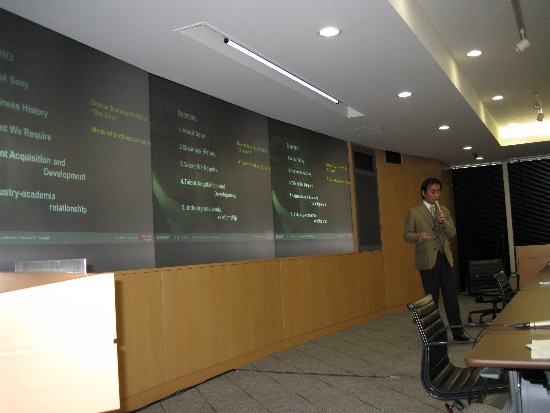
On Friday, March 7, 2014, a speech was given by Mr. Narihiko Uemura (Deputy Senior General Manager, Corporate Human Resource Division, Sony Corporation, concurrently Vice President of Sony University) on Sony’s Talent Development Strategy “What do we value, How do we develop?”. The speech started with the introduction of Sony Corporation and its business strategy, followed by the information about talent that is required by Sony, the approaches to talent acquisition and development, and industry-academia relationship.
Through the speech we were able to learn in details the training program which nurtures “T shaped Talent” i.e. Sony’s global human resources, and the basic philosophy of DNA which supports such human resources development.
March 8, 2013
Toshiba Corporation “Toshiba HR Practices”
Mr. Takeyuki Miyazaki
Group Manager, Human Resources Development Group, Global Human Resources Office, Human Resources and Administration Division of Toshiba Corporation.
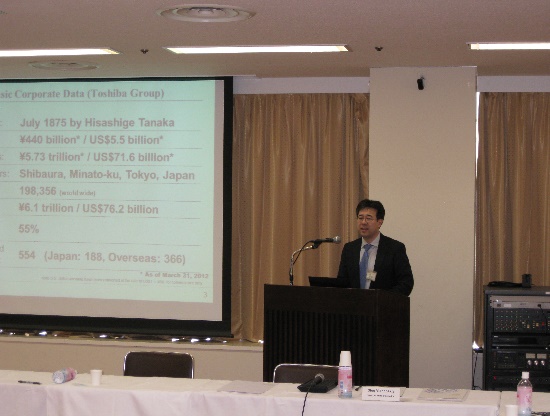
On March 8, following the Accreditation Committee, a lecture on “Toshiba HR Practices” was given by Mr. Takeyuki Miyazaki, Group Manager, Human Resources Development Group, Global Human Resources Office, Human Resources and Administration Division of Toshiba Corporation. Toshiba Corporation has a total 198,356 employees as of 2012, of which 22,984 are based in China and 29,504 in Asia excluding China and Oceania. In total, they account for 27% of the total number of employees. Toshiba’s practices aiming to develop global human resources were introduced, including “Innovation Leader Training”, “Liberal Arts Training”, and “Global Integrated Programs” with INSEAD. Fostering of “Global Talents” aiming at diverse human resources was also mentioned.
March 2, 2012
Nissan Motor Co., Ltd. :”Nissan Way”
Mr. Toru Ihara,
General Manager of Human Resources Planning Group, Nissan Motor Co., Ltd.
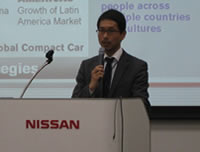
We visited Nissan Global Headquarters and learned Nissan Way. At the meeting, Mr. Toru Ihara, General Manager of Human Resources Planning Group, Nissan Motor Co., Ltd. delivered a thought-provoking talk on Nissan’s challenge towards hybrid cars and electric cars as well as human resources needed for business development in Asia. This was highly appreciated by the Deans of business schools in Asia who took part in the meetings, as the insights shared by Mr. Toru Ihara were very useful for curriculum development. After the discussion the participants visited the Nissan showroom where they were fascinated by the cars equipped with cutting-edge technology.
3. Company Visits
March 9, 2017
Nissan Motor Co., Ltd. “NISSAN Motor Oppama Plant,” Oppama, Japan
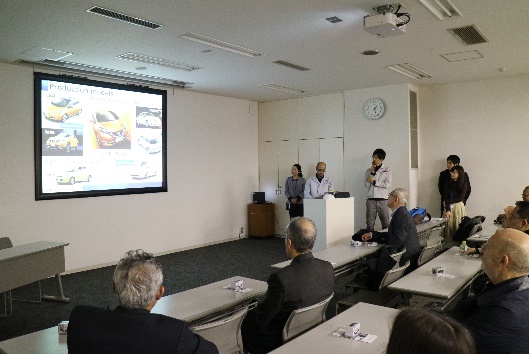
On March 9, 2017, about 30 ABEST21 members were given the opportunity to visit the Nissan Motor Oppama Plant by the kind courtesy of ABEST21 affiliate member, Nissan Motor Co., Ltd. It was explained that the Plant acts as a global originating point for manufacturing, featuring 3 main functions: 1) Master Production Line introducing new technology including manufacturing of electric cars, 2) Global Training Center as a base for training global human resources, and 3) Global Pilot Line – testing new car production at the Oppama’s mass production line before transferring the manufacturing to other production base, to shorten the test time. Tour around the production line and the shipping port followed. Active Q&A session included popularization of electric cars and other topics.
March 2, 2016
SONY Corporation “Sony University,” Shinagawa, Japan
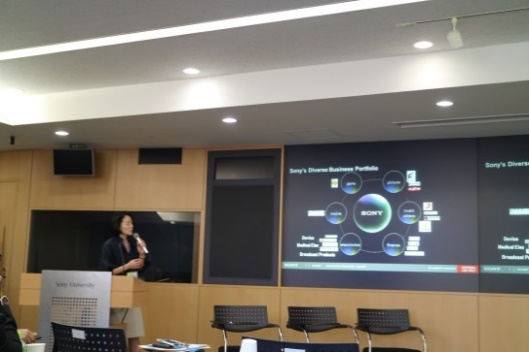
On March 2, 2016, a keynote speech was given by Ms. Tomoko Adachi (photo), General Manager, Human Resources Development Department, Corporate Human Resources Division, Sony Corporation. Ms. Adachi referred to the “Curiosity” of Sony as a driving force of its business, and said that it is this “Curiosity” that promotes product development and quality improvement, and makes Sony as it is today. When Sony Corporation was founded by Masaru Ibuka and Akio Morita, the corporate philosophy included “Do not fear creative failure” and “Always maintain curiosity”. The philosophy still exists as Sony Spirit, and the Company puts efforts in nurturing personnel who can play an active role beyond business fields or regions.
July 6, 2015
TOSHIBA Corporation “Toshiba Science Museum,” Kawasaki, Japan
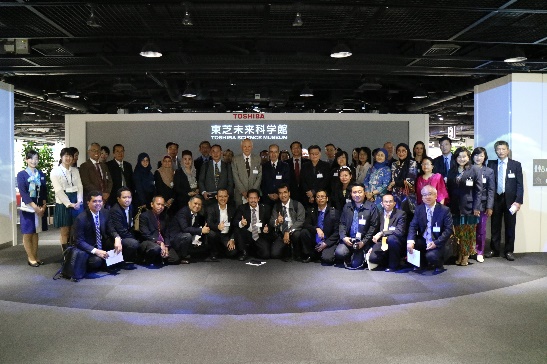
On July 6, we visited the Toshiba Science Museum located in Lazona district in Kawasaki City. We were greeted by Mr. Junji Nakayama (General Manager, Toshiba Science Museum), Mr. Naruo Kinoshita (Deputy General Manager, Toshiba Science Museum), Mr. Noritaka Kimura (Chief Specialist, Diversity & Talent Management Group, Human Resources and Administration Div. Toshiba Corporation) and Mr. Jun Kanai (President, Toshiba Human Resources Development Corporation). They explained about the history of Toshiba group, the first product of Toshiba, cutting-edge technology in the areas of environment, energy, social infrastructure, semi-conductors, digital products, etc., in relation to our future life. Q&A session was held in a separate meeting room.
October 22, 2015
Toyota Motor Corporation “Head Office Motomachi Plant and Toyota and Commemorative Museum of Industry and Technology,” Nagoya, Japan

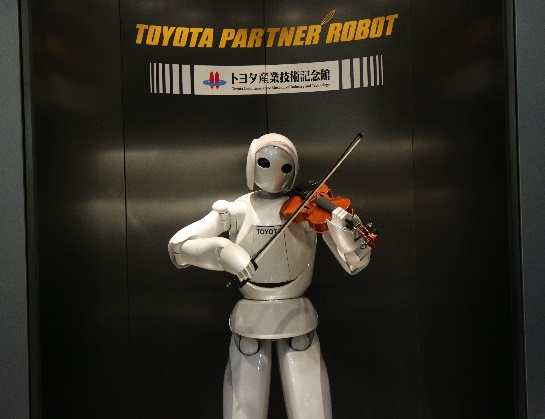
On October 22, 2015, ABEST21 members visited the Toyota Motor Corporation Motomachi Plant. The visit was realized by the courtesy of Mr. Takeshi Fukui, Project General Manager of Toyota Institute. The 1,590,000 m2 of land where the Motomachi Plant is located was previously owned by the government and housed the Koromo factory for Tokai Airplane. Since August 1959, the plant has been the production base for Toyota automobiles including “Crown”, “Mark X” and “Estima”.
Toyota Commemorative Museum of Industry and Technology was established in June 1994 in Sako, Nishi-ku, Nagoya City, at the site of the Headquarters Plant of the former Toyoda Spinning and Weaving Co., Ltd. built by Sakichi Toyoda in 1911. The building is historically important, and the museum preserves and uses it as a valuable industrial asset to show the history of Japanese industry and technology through the historic changes in the weaving machine and automobile production. Some of the demonstrations we enjoyed are: the symbol of the museum – a unique circular loom invented by Sakichi Toyoda in 1906 which weaves fabric using a rotating circular motion; the G-type automatic loom completed in 1924 by Sakichi Toyoda – the world’s best-performing loom at that time; Toyoda Standard Sedan Model AA which is the company’s first passenger car completed in 1936 by Kiichiro Toyoda, the founder of Toyota Motor Corporation, and his colleagues; 600-ton Machine Press launched in 1960 at the Motomachi Plant, Japan’s first factory exclusively for automobiles; and the violin music played by Toyota Partner Robot emphasizing the movement of its arms and legs, which was developed to support housework, care-giving and medical treatment.
March 7, 2014
SONY Corporation“Sony Archives,” Shinagawa, Japan
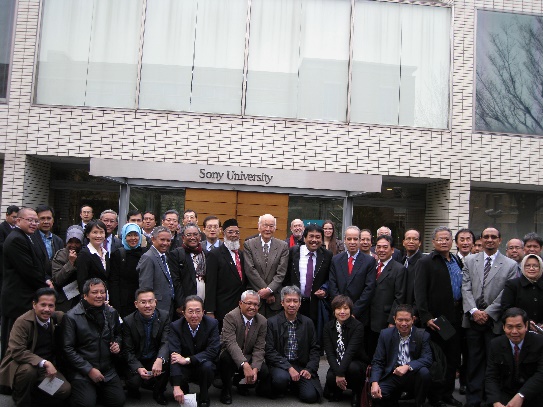
We visited the “Sony Archives” located on the site where Sony began its operation in May 1946. The Archives show approximately 250 products representing the company, including the prototypes of tape recorder and transistor radio, both being the first products made in Japan. We gained a comprehensive understanding of the history of Sony’s technical development and its track as a company.
March 8, 2013
TOSHIBA Corporation “Toshiba Fuchu Complex,” Fuchu, Japan
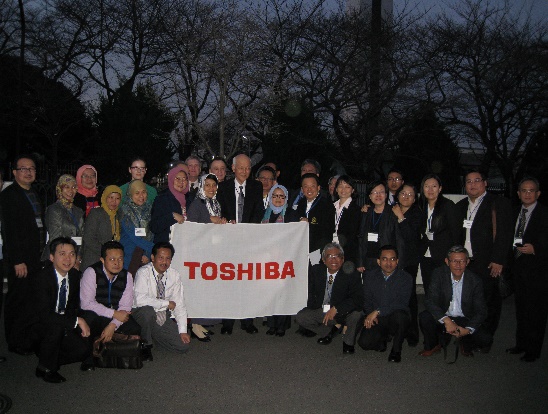
On March 8, following the Accreditation Committee, a lecture on “Toshiba HR Practices” was given by Mr. Takeyuki Miyazaki, Group Manager, Human Resources Development Group, Global Human Resources Office, Human Resources and Administration Division of Toshiba Corporation. Toshiba Corporation has a total 198,356 employees as of 2012, of which 22,984 are based in China and 29,504 in Asia excluding China and Oceania. In total, they account for 27% of the total number of employees. Toshiba’s practices aiming to develop global human resources were introduced, including “Innovation Leader Training”, “Liberal Arts Training”, and “Global Integrated Programs” with INSEAD. Fostering of “Global Talents” aiming at diverse human resources was also mentioned.
Following the Toshiba Lecture, we visited the Fuchu Complex located in Fuchu City, Tokyo. The Complex started its operation in 1940. About 10,000 employees work on this site with total land space of 665,000 sq. meters. In the Smart Grid Presentation Room where “Smart Community” model is presented, the Community was explained as a model to realize an integrated optimized control system for infrastructure including electricity, water, transportation, logistic, medical service and information. Based on this model we imagined our future living area. At the Elevator Development Center, the cutting-edge technology used in making the elevators at Tokyo Skytree was explained.
July 10, 2012
PT. Toyota Motor Manufacturing Indonesia “Karawang Plant”, Karawang, Indonesia
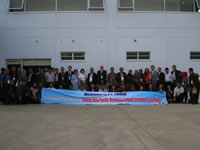
We visited PT. Toyota Motor Manufacturing Indonesia (TMMIN) at Karawang industrial complex in the suburb of Bandung. At the Training Center on the same site Mr. Mamoru Akiyama, Vice President Director, AP Regional Officer talked on nurturing human resources locally in Indonesia. It was mentioned that before being assigned to work at the production line, local staff members are given mental and technical guidance from mentors at “Dojo”. All staff members at the line were working hard and busy. The “Karakuri” of creating high quality based on mental and technical training at “Dojo” was presented.
November 1, 2012
Sony Corporation “The Square,” Shinagawa, Japan
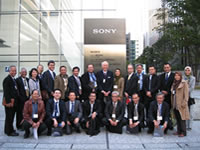
We visited Sony’s showroom “The Square.” In the security products area, we were particularly attracted by the advanced high-resolution network camera “IPELA” for surveillance, and the security system using software “Real Shot Manager” to monitor and record multiple camera images through combination of network and camera. After seeing the cutting-edge technology at The Square, lectures were given at the meeting room by Ms. Makiko Yoneda, General Manager, Recruiting Department, Global Human Resources Development Division.
March 4, 2011
Fuji Xerox “The R&D Square,” Yokohama, Japan
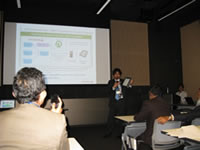
By the courtesy of Fuji Xerox headquarters, we were invited to visit the Fuji Xerox R&D Square. Fuji Xerox was established in 1962 as a joint venture of Fuji Photo Film and U.K.-based Rank Xerox. The R&D Square was completed in 2010 at the Yokohama Minato Mirai district as a part of the Fuji Xerox Yokohama Minato Mirai Office. At the R&D Square, a remote system to share meeting materials on PC terminal on a real time basis was presented to the visitors. This system as a part of the research and development is a remarkable application of the cutting-edge information technology.
November 4, 2011
CANON Corporation“Canon Galley,” Tokyo, Japan
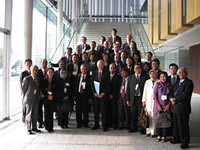
ABEST21 Company Visit was held at CANON Corporation, Tokyo. Other than participants based in Japan, there were 31 participants including Deans and Vice Deans of Asian and EU business schools. At Canon Inc. Head Office various approaches for human resources development were explained. We toured the Canon Gallery.
March 5, 2010
Nippon Steel Corporation “Kimitsu Works”
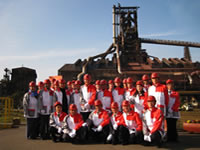
The tour of Nippon Steel Corporation Kimitsu Works was realized by courtesy of President Makoto Haya of Nippon Steel Engineering Co., Ltd., a member of the ABEST21 Accreditation Committee. Kimitsu Works was established in 1965 and is known as one of the largest steel plant in the world with annual raw steel production of 10,000,000 tons. Viewing the full automated dynamic process of heavy plate hot rolling was impressive in particular, as well as the details of 100% recycling process of plastic packaging from general household garbage using the existing coke oven.